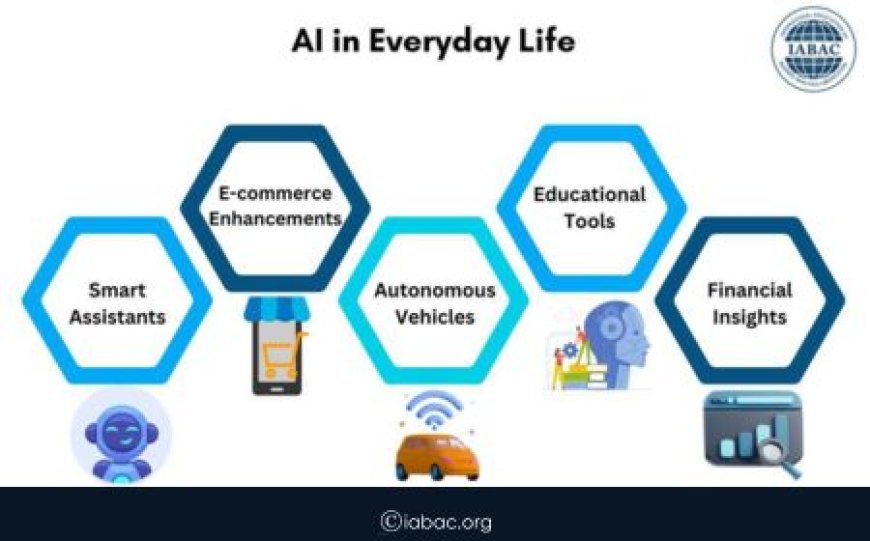How The Impacts Of AI Technology on daily activities and transforms industry. Examine its influence on society, the economy, and personal experiences.
Table of Contents
- AI’s Delicate Integration into Our Daily Lives
- Addressing the Privacy the quandary: Balancing AI Effectiveness with Personal
- How has our increasing dependence on AI affected how we accomplish daily tasks?
- Let’s examine each type a little more closely.
- The 10 Effects of AI in Our Daily Lives
- What Opportunities Can We Expect From AI in the Future?

Artificial intelligence (AI) has smoothly merged into our daily lives, transforming the way we live, work, and interact. This transformational technology, although intriguing, also poses problems. Its influence may be seen in many facets of our daily lives, indicating a fundamental shift in our social landscape. The broad usage of AI demonstrates its expanding relevance, highlighting the necessity for a balanced examination of its benefits and possible drawbacks.
AI’s Delicate Integration into Our Daily Lives
As we progress through the twenty-first century, artificial intelligence has gradually become a vital aspect of our life. Whether through virtual assistants or recommendation algorithms, its impact is widespread. This stealthy incorporation into our everyday activities is noteworthy, as AI acts in the background, frequently missing human detection. Understanding this reality necessitates realizing how AI has become a subtle yet pervasive force in molding the fabric of human life.
Addressing the Privacy the quandary: Balancing AI Effectiveness with Personal
Information Protection
One of the problems of this integration is the blurring distinction between convenience and privacy. While AI-powered gadgets improve productivity, they also gather large quantities of data, raising worries about personal information security and privacy. The difficult balance between reaping the benefits of AI and protecting our privacy becomes an important factor.
How has our increasing dependence on AI affected how we accomplish daily tasks?
The rising dependence on AI has altered routine activities by simplifying procedures and increasing efficiency. Our habits have transformed, with smart home gadgets automating tasks and AI-powered personal assistants controlling calendars, allowing us to achieve more with greater ease and speed.

Our routines have moved from smart home gadgets automating tasks to AI-powered personal assistants that manage scheduling.
Let’s examine each type a little more closely.
AI in Healthcare
AI has shown to be beneficial in the healthcare industry. From diagnostic tools to individualized treatment strategies, the use of AI has greatly improved patient outcomes. However, when it comes to the protection of sensitive health data, an ethical concern arises. To ensure the ethical use of AI in healthcare, the correct balance must be struck by adopting strong data protection measures and strict laws.

Education and AI
In education, AI is transforming the learning process. Personalized learning platforms use AI algorithms to adapt to each student’s unique demands, resulting in a more effective and individualized educational journey. Nonetheless, worries emerge about data ownership and the possibility of algorithmic bias. Addressing these problems necessitates openness in algorithmic decision-making and the creation of comprehensive frameworks that promote equity.
AI in the workplace.
AI integration is changing the employment landscape. Automation simplifies operations, increasing efficiency, but the fear of job loss is obvious. To address this worry, reskilling and upskilling activities become critical, ensuring that the workforce is prepared to navigate the dynamic employment market. Balancing the benefits of AI-driven efficiency with employee well-being is an important topic.
Social Interaction and AI
AI’s influence on social interaction is visible in the algorithms that regulate our online interactions. Social media networks use AI to select material, which influences the information we see. The risk of living in echo chambers, as well as the possibility of spreading disinformation, underline the importance of ethical AI control. Striking a balance entails increasing algorithmic transparency and giving people greater influence over the material they receive.
Ethical considerations
As artificial intelligence grows more integrated into our daily lives, ethical concerns become increasingly important. The ethical use of AI requires scrutinizing not just how the technology is deployed, but also the goals behind its deployment. Establishing ethical rules and laws is critical for mitigating the hazards associated with unrestrained AI development.
The 10 Effects of AI in Our Daily Lives
AI has gradually crept into our daily lives, from the music we listen to to the food we consume, and even how we interact with our gadgets and the internet.
Voice assistants – AI-powered voice assistants like Siri, Alexa, and Google Assistant have grown ubiquitous in our daily lives, assisting us with anything from making reminders to controlling our smart home gadgets.
Smarter houses – Artificial intelligence powers smart home devices such as thermostats, security cameras, and lighting, allowing them to learn and change based on human preferences.
Tailored Experiences – Artificial intelligence is rapidly being utilized to give customers with tailored experiences, such as targeted advertising, suggestions, and customer support.
Improved Healthcare – Artificial intelligence is revolutionizing the healthcare business, from illness diagnosis to outbreak prevention and patient outcomes.
Enhanced Efficiency – Artificial intelligence (AI) is helping to automate jobs and processes, resulting in enhanced efficiency in areas including manufacturing, logistics, and transportation.
Enhanced Security – AI is being utilized to improve security, from face recognition to detecting possible security concerns.

Employment Displacement – While AI creates new employment prospects, it also eliminates some jobs that can be automated, raising fears about the future of labor.
AI is being utilized to improve education, including individualized learning programs and intelligent tutoring systems.
Improved language translation – Artificial intelligence is being utilized to improve language translation systems, allowing individuals to converse across languages and cultures.
Fraud detection – Artificial intelligence is being utilized in finance and banking to identify fraud and defend against cyberattacks.
What Opportunities Can We Expect From AI in the Future?
AI has the ability to transform numerous sectors, opening up new prospects for innovation and prosperity. AI is being applied in areas such as healthcare, banking, and manufacturing to enhance efficiency, save costs, and make sound judgments. AI is expected to contribute $15.7 trillion to the global economy by 2030.
AI’s future uses include autonomous robotics, virtual assistants, and smart cities. AI has the ability to revolutionize the way we work by automating routine chores and allowing for new levels of cooperation and creativity. The possibilities are boundless, and the future of AI promises to be fascinating.
To take advantage of these opportunities, many people are enrolling in an artificial intelligence and data science or data science and AI course to get the skills and knowledge required to work with AI and other developing technologies.
The widespread integration of AI into our daily lives provides both exceptional convenience and ethical issues. AI’s effect spans healthcare, education, the workplace, and social relationships. Balancing the advantages with privacy issues and job displacement requires us to navigate this technology landscape properly. As AI evolves, the prospects for invention expand, offering a future of cooperation and creativity. To capitalize on these opportunities, individuals are actively obtaining abilities via AI and data science courses, enabling oneself to make contributions and help shape the exciting trajectory of artificial intelligence.






